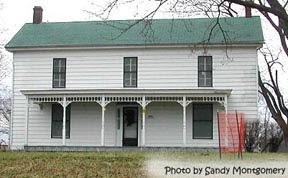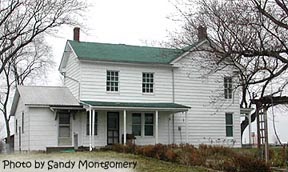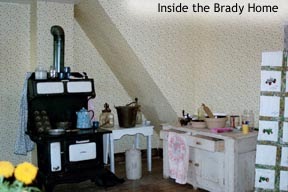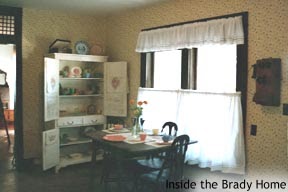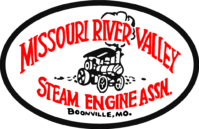Boonville Daily News, 2003
Story by Rob Wilson
Mr. Arnold Brady
Mr. Arnold Brady
By Rob Wilson
Boonville Daily News
2003
On December 9, 2003, Arnold William Brady, a well-known figure around the Cooper County area, passed away at the age of 89. Before he passed away, Brady left a legacy to the Missouri River Valley Steam Engine Association (MRVSEA). On August 17, 1997, Brady donated about 82 acres of his family’s farm to the association. The association honored Brady by naming the property “Brady Showgrounds.”
“He wanted the farm to be a memorial to his family,” said Dennis Ficken, president of the MRSVEA. “He was most interested in seeing the land maintained as a farmstead and used by the community in which his family spent their entire life.”

With the new land acquisition, the MRSVEA has been able to expand its operations and provide the community with another place of recreation while adhering to Brady’s wishes.
According to Ficken, the association has seen an increase in the number of members from the community since the donation of land. “We are growing every year. With the new land we are not getting different members to build stuff on the property.”
“We outgrew the land we were at and it was pretty neat to have a showgrounds that’s an actual farmstead,” said Ficken. “Now we have six new buildings, which is three times the number of buildings we had at the old place.”
Controlling the improvements made to the property has allowed the MRVSEA latitude in services provided to the community. For instance, Ficken explained the association is in the process of moving a 55-foot by 33-foot church, adorned with stained-glass windows and an amphitheater, from the Woodlandville, Missouri, area to the property. Once the church is erected on the property, the association intends to allow the community to rent the building for weddings and possibly other events.
Making labor easier is a theme generally displayed during the annual MRVSEA Fall Show held at the Brady Show Grounds. Although the activities performed at the show may be more labor intensive than today’s current technological-advance ways of working smarter not harder, they do provide individuals with a look into the rudimentary stages of the Industrial Revolution. At the same time, the activities provide a way to memorialize the efforts by the Brady family to keep their farm in operation on those actual “showgrounds.”
Growing up during the Great Depression, Brady was forced to be industrial by nature in finding ways to financially survive. Born August 17, 1914, in Wooldridge, Missouri, the son of Atlas and Mary E Friedrich Brady, Brady spent his entire life in Cooper County, Missouri. When he was almost three years old his family moved to the Overton, Missouri area taking over the farm once owned by Vest Calvert.
After graduating from Highland School in 1929, Brady attended the C.H. Dunkle’s Business School in Boonville, Missouri. While attending he received certificates of the American Penman on February 4, 1030, before finishing a commercial course July 2, 1930.
While attending Highland School, Brady worked as a janitor for the school, his church, and also made fires at the school. In total, these jobs netted Brady $6.50 per month.
A report submitted by the MRVSEA summarizes Brady’s resourcefulness in obtaining money while depicting financial life during the Great Depression. According to the report, Brady’s first savings was recorded at the age of 13 when he saved $10. It was noted his first deposit was at Kemper Bank in the amount of $13. Also, at the age of 13, after purchasing a colt for $9.75, and a halter for $.25, Brady walked 15 miles to lead the colt home. When he was 16, Brady bought a cow for $41.50. At the age of 17, he worked for himself and a team on the Missouri River earning $5.60 per day. Later, when Davis Construction Company built the east end of Highway 98, Brady drove a team for the company which earned him $2.36 per day. In 1935, Brady bought a pair of western horses from Colorado for $110, which he later sold in 1936 for $210.
“He hunted and picked up what few dollars he could while staying at home and working for board,” the report added.
On January 17, 1936, Brady received his diploma from Repperts School of Auctioneering. While attending the auction school he learned livestock judging, pedigree study, physical and vocal training, public speaking, sales methods, and auction practice. For a short period of time Brady helped at the Patrick and Sims Sale Barn and actually “cried a few sales himself.” Many pie suppers held at schools in the Howard and Cooper County area were auctioned by Brady.
In July, 1936, Brady was able to buy his first tractor, plow, and disk and began farming land known as the C.C. Groom place. In 1938, he married Vena Mason Ashpaugh.
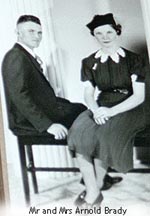
In 1940, Brady bought his first truck, in 1941, bought his first combine, and later, in 1951, bought his first car.
Since help was scarce during the 1940’s. Brady farmed his father’s land before buying the Herman Kosfeld place. Because his father’s health was poor Brady had to stay home and do the feeding on his dad’s farm. He farmed the land for half the crops and in 1961, his parents moved to Boonville so Brady bought his father’s farm.
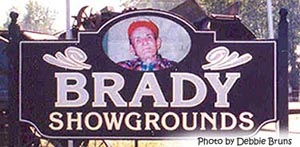
People that knew Brady described him as a man who liked to talk and loved his dogs. “He knew everything that was going on in the area,” said Verena McKinney, long time friend of Brady. “People always thought he was a little goofy, but, he just liked to talk. He would go around and tell his stories and that is what made him happy.” “He was just a character,” added McKinney.
By donating his land to the MRVSEA, Brady has left a lasting legacy. That legacy is one that can be remembered as hard work, perseverance, and determination to better one’s status in life, even during the toughest times. To step foot onto the Brady Showgrounds is to step foot into that legacy.
